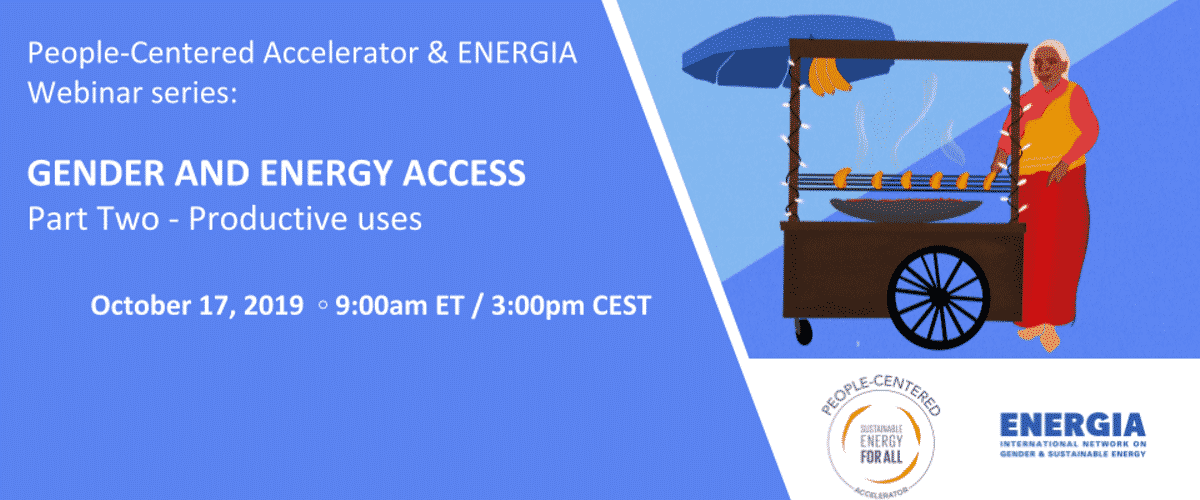On October 3, 17 and 31, ENERGIA and SEforALL’s People-Centered Accelerator, organised a three-part webinar series on Gender and Energy Access. The series focused on our five-year Gender and Energy Research programme (2014 – 2019). The last webinar included findings from our Women’s Economic Empowerment (WEE) Programme.
The research programme aimed to generate and analyse empirical evidence on the nexus between gender, energy and poverty, to inform energy policy and practice. Specifically, the research explored the linkages on gender, energy and poverty in six thematic areas:
- Electrification
- Productive uses of energy
- Energy sector reform
- The role of the private sector in scaling up energy access
- The political economy of energy sector policies
- Women’s energy entrepreneurship.
This programme was performed by nine teams involving more than 70 researchers, across 12 countries with the cooperation of 29 partner organisations. It was unique in its scale and first of its kind, urged by the need to reduce the existing research gap and have an extensive understanding based on evidence, beyond case studies. The findings are presented in seven reports and can be accessed on our website together with a synthesis report, which presents a prioritised selection of key messages and associated policy implications. Our publication “Supporting last-mile women energy entrepreneurs: What works and what does not” based on our WEE programme can also be found here.
In the webinar series, the presenters highlighted specific aspects of their studies and provided insights on the differentiated impacts of access to energy and energy services, policies and subsidies for women and men. In case you missed it, here’s a recap where we have summarised the key takeaways. The slides and the recording can be found here.
Webinar 2: Gender and Energy Access
Part two – Productive uses of energy
This webinar focused on ways energy can support women’s income-generating activities and provided findings from RA2 and RA6. Based on their research, presenters shared key recommendations to ensure that modern energy services contribute to both women’s and men’s economic and social empowerment.
A gendered approach to PUE can promote benefits for women
Mar Maestre from the Institute of Development Studies (IDS) presented the work from RA6 which looks at productive uses of energy (PUE) and how using a gendered approach can promote more benefits for women. The research conducted in Ghana, Myanmar and Tanzania found that current approaches to PUE have different outcomes for women and men. Men are more likely to benefit from PUE interventions that focus on electricity because they more often own or are employed in electricity intensive enterprises than women, e.g. welding and mechanic. The data also show a clear differentiation of fuels used for productive activities by men and women. For example, charcoal is mostly used by women who are more in the food sector, while diesel is used by men who operate more heavy machinery. To support men and women’s PUE, the researchers recommend two sets of policies. PUE interventions that:
- Support the different types of activities that men and women currently do and leave no one behind.
- Transcend traditional sectoral segregation as well as segregation within sectors, moving towards equity in the use of energy at work.
Energy in the street food sector
The second presentation by Jiska de Groot from the University of Cape Town, focused on the gendered use of energy in the street food sector (SFS) in Rwanda, Senegal and South Africa and explored the links between use of modern energy services (MESs) and empowerment of men and women in this sector. The research delves into the growing role of the SFS, the energy needs and the opportunities for women, who are particularly motivated to set up enterprises in this sector due to low barrier to entry and close ties to women’s traditional household tasks related to cooking.
To benefit from modern energy services, women-owned businesses in the SFS can be supported by energy-related policies and interventions:
- Running or being employed in a street food sector enterprise usually enhances the individual decision-making power, self-confidence, control over finances, appreciation and support to the family and community. Therefore, the large participation in the sector by women can create serious empowerment ‘wins’ by targeting the street food sector as a whole.
- Considering the multiple sources of energy in the SFS, access to appropriate services rather than necessarily ‘modern’ energy services must be ensured to stimulate the sector.
- It remains important to recognise the relationship between household energy uses and productive uses in particular for the street food sector, and in particular for women’s businesses. For example entrepreneurs use household energy for food preparation. Therefore, policies for access to modern energy services need to also consider productive uses of energy, and need to apply a gender-lens.
- Thriving SFS is highly depending on the local area in which it operates. Local authorities are key in influencing regulations that impact energy use. So, for improved spatial planning, there is a need to understand the SFS sector and a better integration between municipal and local authorities from different sectors.
- The SFS has an important role in feeding Africa’s growing urban populations and its importance is likely to increase. Therefore, policy makers need to work with the sector rather than work against it and removing it from the urban landscape.
The slides and the recording of this webinar can be found on our website. You can read the key takeaways from the first webinar here and from the third webinar here. More information on the research teams involved in this webinar can be found here.







